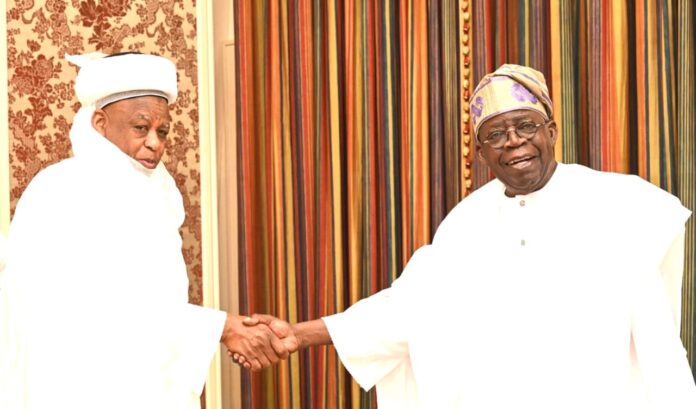President Bola Ahmed Tinubu on Friday met with the Sultan of Sokoto, Alhaji Muhammad Sa’ad Abubakar III, at the State House, Abuja, in what officials described as part of ongoing efforts to strengthen unity and promote peace across Nigeria.
The meeting, which was held behind closed doors, came only a few days after the President received the Archbishop of Abuja, Most Rev. Ignatius Ayau Kaigama, in the same venue. Both engagements, according to Presidency officials, form part of Tinubu’s consultations with key religious and traditional leaders to deepen dialogue and rebuild trust among Nigeria’s diverse communities.
The Special Assistant to the President on Social Media, Dada Olusegun, shared short video clips of the meetings on his X (formerly Twitter) page. He said the discussions were “part of the President’s ongoing consultations with faith and cultural leaders to promote peace, national cohesion, and mutual understanding.”
Sources within the Presidency said that the meetings were intended to explore ways to consolidate peace, enhance national integration, and tackle emerging social challenges.
According to the officials, the engagements are consistent with the President’s Renewed Hope Agenda, which places strong emphasis on inclusivity, interfaith harmony, and dialogue as tools for building national stability.
“The President believes that religious and traditional institutions play a key role in maintaining peace and social order,” one source said. “He is consulting widely to ensure that every community feels included and heard in his administration’s drive to unite the country.”
Since taking office in May 2023, President Tinubu has repeatedly stressed the importance of peace, tolerance, and dialogue between Nigeria’s major religious and ethnic groups. His administration has hosted several interfaith forums and peace meetings, particularly in response to rising insecurity and communal clashes in some regions.
The Sultan of Sokoto, who is also the President-General of the Nigerian Supreme Council for Islamic Affairs (NSCIA), has long been an advocate of peace and unity in the country. He has consistently called on political leaders to protect the rights of all citizens regardless of faith and to address the root causes of violence and extremism.
Similarly, Archbishop Kaigama has often spoken about the need for religious leaders to work together in defending peace and justice. He has emphasized that genuine national development can only be achieved when there is mutual respect and cooperation among people of different faiths.
The timing of Tinubu’s meetings with the Sultan and the Archbishop is significant, coming shortly after the United States redesignated Nigeria as a “Country of Particular Concern” (CPC) over alleged violations of religious freedom.
On October 31, 2025, former U.S. President Donald Trump announced the decision, citing what he called “severe and systematic religious persecution” in Nigeria. He claimed that more than 7,000 Christians were killed in the first seven months of 2025 by extremist groups such as Boko Haram, the Islamic State West Africa Province (ISWAP), and armed herdsmen.
The U.S. government said the designation was aimed at drawing global attention to what it viewed as rising attacks on Christian communities in Nigeria.
However, the Nigerian government has strongly rejected the claims, describing them as exaggerated and misleading. Officials have maintained that Nigeria’s constitution guarantees freedom of religion and that both Christians and Muslims have been victims of terrorism and violent crime in different parts of the country.
The Ministry of Information said the U.S. report ignored the Nigerian government’s ongoing efforts to restore peace and prosecute those involved in sectarian violence. It added that linking insecurity solely to religion was unfair and did not reflect the country’s complex realities.
The meeting also comes as Nigeria continues to battle economic hardship and public discontent over rising living costs. Analysts say ensuring social harmony and trust is vital to preventing religious or ethnic divisions from deepening during this period of economic strain.
While details of the conversation between Tinubu and the Sultan were not made public, sources said the two leaders discussed ways to promote religious tolerance, support community-based peacebuilding, and strengthen cooperation between the government and faith institutions.
As the administration pushes forward with its Renewed Hope Agenda, many Nigerians are watching to see whether these high-level consultations will translate into concrete actions that improve security and foster unity.

